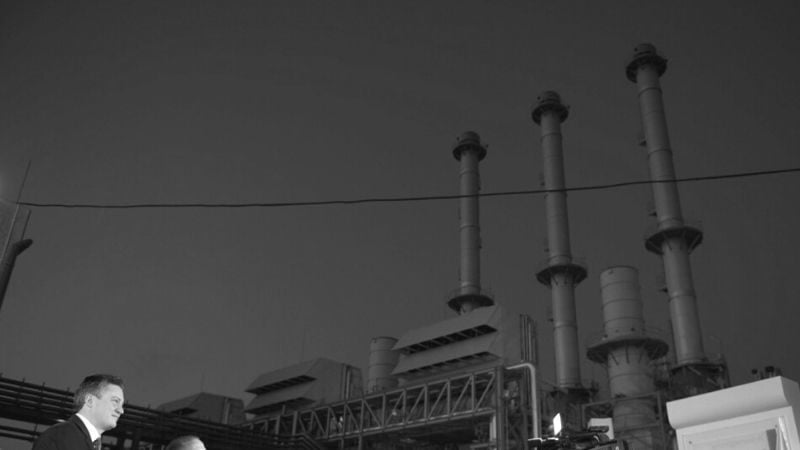Public funds should not be used to enrich people accused of committing serious crimes, the family of assassinated journalist Daphne Caruana Galizia said, following the news that the EU could be set to fund the building of a gas pipeline to serve the Electrogas power station, which is part-owned by one of her accused murderers, Yorgen Fenech.
A press conference held today was addressed by Daphne’s son Matthew who is also Director of the Daphne Caruana Galizia Foundation, Claudia Gammon MEP and shadow rapporteur for the TEN-E file for the Renew Group, and Marie Toussaint MEP, shadow rapporteur for the Greens/EFA group.
MEP Marie Toussaint said that it was important “to explain what is going on with this project that the Maltese government is trying to get derogations for with total opacity”.
“It’s a real public scandal,” she said.
The speakers stressed that the possibility that the EU might agree to a derogation sought by Malta, and Cyprus, for the funding of gas-pipeline even after the cut-off date for funding of any fossil-fuelled projects in the bloc, represents s a “moral emergency for Europe” and that it’s “unacceptable” that European money should go into a pipeline that rewards the murderers of Daphne Caruana Galizia.
It’s essential that “this derogation doesn’t happen,” Matthew Caruana Galizia said. “It should be completely struck off the books as if it never existed in the first place”.
The Caruana Galizia want “complete justice for my mother,” Matthew said. This means complete accountability, the reversal of the corruption that led to her murder, and no more money handed to the individuals involved in her killing. And it also means “public funds not being used to pay people accused of seious crimes,” he said.
On 21 November, The Guardian reported that EU funds could help build a gas pipeline between Delimara power station in Malta and Sicily. The station is part-owned by Yorgen Fenech, who is currently awaiting trial for conspiracy to murder Caruana Galizia in 2017.
EU subsidies for fossil fuels, including gas, will be phased out by the EU, but Malta, along with Cyprus, has managed to secure an exemption. The project has been included on the 5th PCI list, determining whether funds towards the EUR 400 million project will be granted. A decision is expected in early 2022.
If the project is approved and funding is granted, all profits from the gas coming from Sicily to Malta will go to both the shareholders of Electrogas and those involved in the power plant, including accused murderer Fenech.
The news has been controversial, not just because it will lock in Malta’s dependency on gas, but because the power station is part-owned by a man on trial for one of the most notorious assassinations in the EU in recent years.
MEP Claudia Gammon said it’s important “that we shine a light on this issue and that we don’t let the council get away with trying to put this through under the radar”.
It’s equally important, she said “that the EU stays credible, especially when it comes to transparency, democracy and the rule of law”. She stressed also, that for this to be credible, it’s crucial that journalists, and whistleblowers are given effective protection.
Fenech is no longer a director of Electrogas, but he and his family still have vital stakes.
Earlier this year, he was charged with conspiracy in her assassination and could face up to life in prison if found guilty.
At the time of her murder, Caruana Galizia was investigating the Electrogas deal. Maltese police say they believe the motive was her investigation of the power plant and the deal.
Shortly after the Labour Party came to power in 2013, the new government started shopping around for a new natural gas supplier.
The subsequent deal that saw Maltese taxpayers pay over the odds for natural gas was awarded to a consortium including Fenech’s company Tumas Group and SOCAR, belonging to the Azerbaijani state.
The deal, described as Pieter Omtzigt, the Council of Europe rapporteur who looked into the circumstances around her assassination and was instrumental in pushing for a public inquiry, described the deal as “sinister”.
His report noted that the “facts have given rise to widespread suspicions of corruption and money laundering,” and that government officials were “instrumental” in arranging for certain parties to profit from various aspects of the deal”.
It was then discovered by Maltese investigative journalists that the Maltese state energy company, Enemalta would end up paying twice the market rate for natural gas through the deal, giving SOCAR at least $40 million in profit.
Further revelations show that Fenech, through a company called 17 Black, was set to make payments of EUR150,000 a month to Panama companies owned by Mizz and Schembri, who helped broker the deal.
Even Malta’s Auditor General raised concerns that “the selection committee had been inconsistent in assessing bids” and “changes to parameters were made during the selection process”. It was also noted that there were “concerns over the design of the project overall”.
Yet, to date, no one has been prosecuted, much less convicted, of corruption or wrongdoing in connection with the deal. While they have not been able to hold onto their positions, those involved have maintained their innocence.
An off-the-record European Commission source told The Shift that Malta needs to solve its “energy isolation” through the trans-European gas network. This is the reason the Malta-Italy pipeline has been considered.
They noted that despite inclusion on the PCI list, which will take the project another step closer to funding, Malta will still have to be independently evaluated.
Failing to respond to any questions on whether funding a company linked to a man charged with murder is acceptable by EU standards, they said, “We would point out that the Commission has not had any contact with Electrogas and that they are not the project promoter”.












